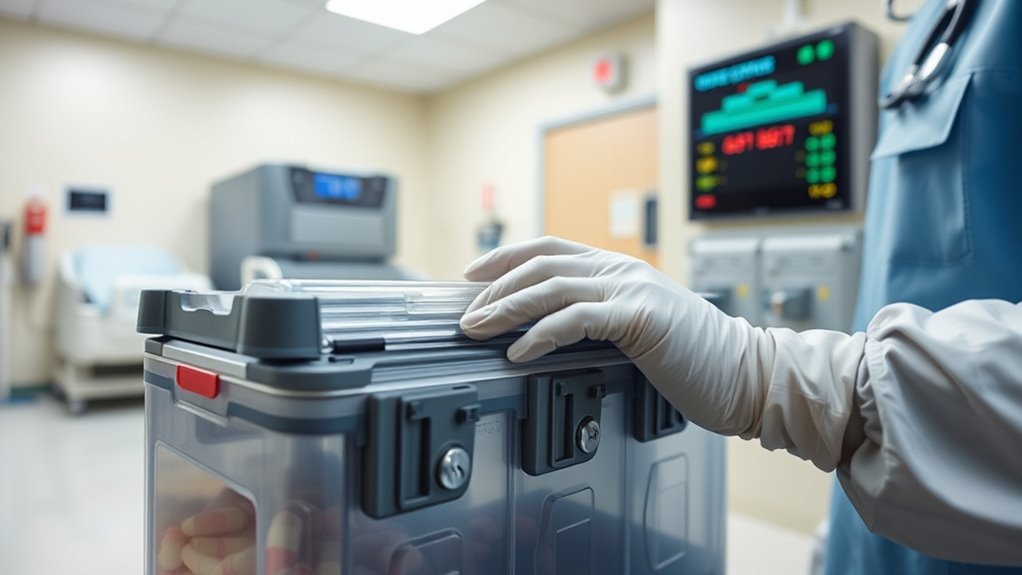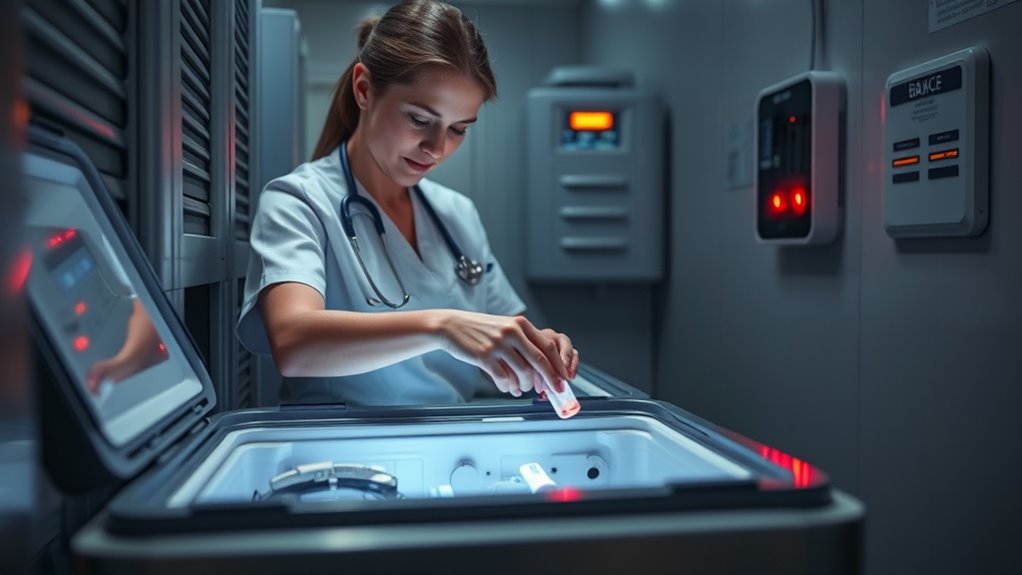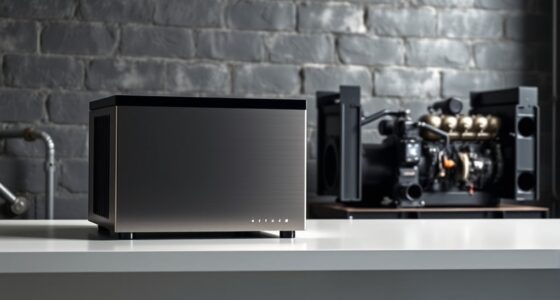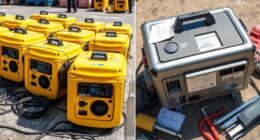To protect your medical devices and medicines during outages, make certain you have reliable backup power systems like battery backups and generators in place. Regularly test and maintain these systems to confirm they’re ready when needed. Keep temperature control devices, such as uninterruptible cooling units, operational to prevent spoilage. Additionally, set up alarms for power or environmental issues to alert staff immediately. If you want to find out how to optimize these safeguards, there’s more to contemplate.
Key Takeaways
- Regularly test and maintain backup power systems to ensure immediate functionality during outages.
- Use uninterruptible power supplies (UPS) and battery backups for continuous device operation.
- Implement temperature control solutions like backup refrigeration to preserve medicines and biologics.
- Integrate power and temperature monitoring systems with alarm notifications for prompt staff response.
- Train staff on emergency protocols and maintenance procedures to safeguard devices and medications during power disruptions.

In today’s healthcare landscape, protecting medical devices and medicines from threats is more essential than ever. Power outages, whether caused by storms, technical failures, or grid issues, can jeopardize patient safety and compromise critical treatments. That’s why having reliable backup systems is indispensable. Battery backups, in particular, serve as a crucial line of defense. When the main power supply fails, these units kick in instantly, ensuring that life-saving equipment like ventilators, infusion pumps, and monitors stay operational. You need to regularly test and maintain these backups to guarantee they’re ready when needed, as a dead battery can be just as dangerous as no backup at all. Properly functioning battery backups prevent disruptions that could lead to treatment delays or errors, safeguarding patient health during emergencies. Additionally, selecting reliable backup power solutions tailored to healthcare needs can greatly enhance safety and resilience.
Temperature control plays an equally significant role in protecting medicines and sensitive devices during outages. Many pharmaceuticals, vaccines, and biologics require strict temperature conditions to remain effective. When power is cut, environmental fluctuations can quickly jeopardize their integrity. You must have systems in place that monitor and regulate temperature, such as uninterruptible cooling units or backup refrigeration, to prevent spoilage. Not only does this preserve the efficacy of vital medicines, but it also reduces waste and costs associated with spoilage. For devices like incubators or laboratory equipment, maintaining a stable temperature prevents malfunction and ensures reliable results. In outage situations, quick deployment of temperature control measures becomes critical, so you should establish protocols and have backup solutions ready to activate.
Combining battery backups with temperature control strategies provides a comprehensive approach to safeguarding healthcare assets during power failures. You should consider integrating these systems with alarm notifications that alert staff immediately if power is lost or environmental conditions fall outside safe ranges. This way, you can respond promptly and prevent potential disasters. Regular maintenance, testing, and staff training are indispensable components of an effective outage plan. It’s not enough to have equipment in place; you must ensure it works flawlessly when it’s needed most. By proactively managing backup power and temperature regulation, you’ll help guarantee that medical devices continue functioning accurately and medicines stay effective, ultimately protecting patient safety and maintaining the quality of care.
Frequently Asked Questions
How Can I Prepare My Home for Medical Device Power Outages?
To prepare your home for medical device power outages, you should create an emergency preparedness plan that includes a backup power source like a generator or battery system. Keep extra batteries, supplies, and a list of nearby emergency facilities. Make certain your home safety measures are up-to-date, and inform family members about your needs. Regularly test your backup systems to stay ready, so you can maintain your medical devices during outages.
What Are the Best Backup Power Options for Medication Refrigeration?
You should consider battery backups and solar generators as the best backup power options for medication refrigeration. Battery backups are reliable and provide immediate power during outages, protecting your refrigerated medicines. Solar generators are eco-friendly and can be charged during sunny days, offering a sustainable energy source. Both options guarantee your medication stays at the correct temperature, preventing spoilage and maintaining their effectiveness during power disruptions.
How Often Should I Test Emergency Power Systems for Medical Devices?
Think of your emergency power system as a loyal guardian; you need to check its armor regularly. You should test your backup power at least quarterly, ensuring battery maintenance is up to date and surge protection is active. This keeps your system ready to leap into action when needed, preventing surprises and ensuring your medical devices stay powered and safe during outages. Regular testing is your shield’s best maintenance.
Are There Portable Generators Suitable for Medical Use During Outages?
Yes, there are portable generators suitable for medical use during outages. Look for medical-grade power portable generators, which provide clean, stable electricity essential for sensitive medical devices. These generators are designed to meet strict safety standards and can power critical equipment reliably. Make sure to choose models with sufficient wattage and features like automatic transfer switches to ensure continuous, safe operation during power interruptions.
What Legal Requirements Exist for Hospitals to Protect Medical Supplies During Outages?
You must follow regulatory compliance requirements, such as those from OSHA and the FDA, to guarantee your hospital adequately protects medical supplies during outages. These regulations often mandate backup power systems and proper storage protocols. Additionally, consider liability considerations; failure to comply can result in legal consequences and jeopardize patient safety. Regularly review and update your emergency preparedness plans to meet evolving legal standards and minimize risks during outages.
Conclusion
You now understand the importance of safeguarding medical devices and medicines during outages. Did you know that nearly 60% of healthcare facilities have experienced power disruptions that impacted patient care? By taking proactive steps, you can guarantee continuous treatment and safety. Remember, a quick preparedness plan can make all the difference—keeping essential devices running and medicines effective when it matters most. Stay vigilant and keep your healthcare environment resilient against outages.









